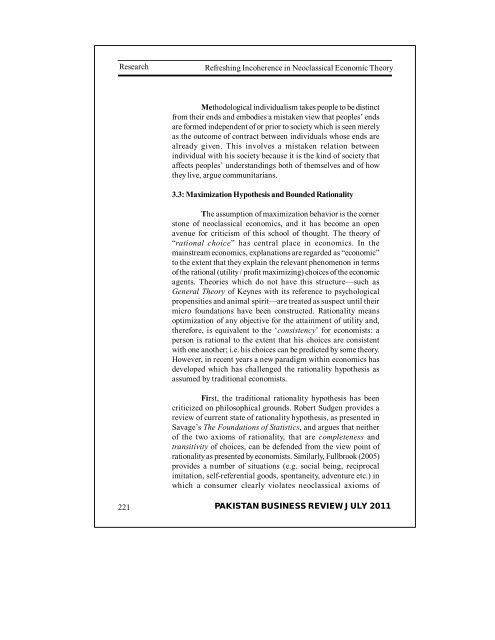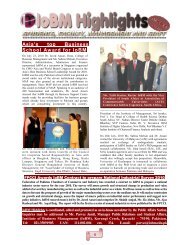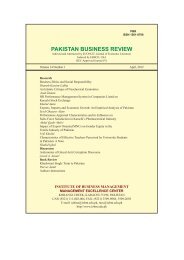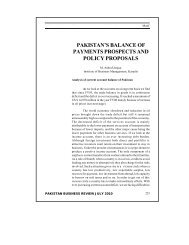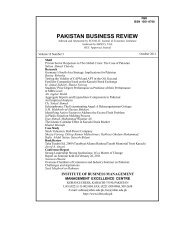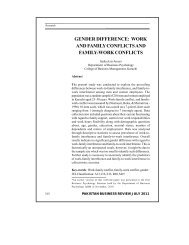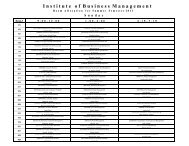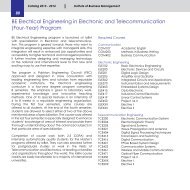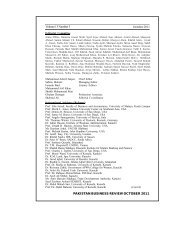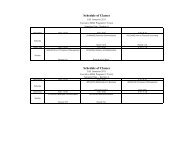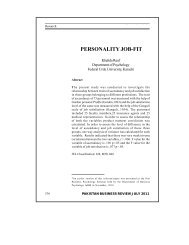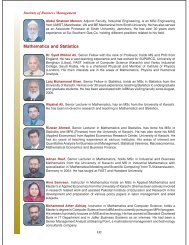PAKISTAN BUSINESS REVIEW - Institute of Business Management
PAKISTAN BUSINESS REVIEW - Institute of Business Management
PAKISTAN BUSINESS REVIEW - Institute of Business Management
You also want an ePaper? Increase the reach of your titles
YUMPU automatically turns print PDFs into web optimized ePapers that Google loves.
Research<br />
Refreshing Incoherence in Neoclassical Economic Theory<br />
Methodological individualism takes people to be distinct<br />
from their ends and embodies a mistaken view that peoples’ ends<br />
are formed independent <strong>of</strong> or prior to society which is seen merely<br />
as the outcome <strong>of</strong> contract between individuals whose ends are<br />
already given. This involves a mistaken relation between<br />
individual with his society because it is the kind <strong>of</strong> society that<br />
affects peoples’ understandings both <strong>of</strong> themselves and <strong>of</strong> how<br />
they live, argue communitarians.<br />
3.3: Maximization Hypothesis and Bounded Rationality<br />
The assumption <strong>of</strong> maximization behavior is the corner<br />
stone <strong>of</strong> neoclassical economics, and it has become an open<br />
avenue for criticism <strong>of</strong> this school <strong>of</strong> thought. The theory <strong>of</strong><br />
“rational choice” has central place in economics. In the<br />
mainstream economics, explanations are regarded as “economic”<br />
to the extent that they explain the relevant phenomenon in terms<br />
<strong>of</strong> the rational (utility / pr<strong>of</strong>it maximizing) choices <strong>of</strong> the economic<br />
agents. Theories which do not have this structure—such as<br />
General Theory <strong>of</strong> Keynes with its reference to psychological<br />
propensities and animal spirit—are treated as suspect until their<br />
micro foundations have been constructed. Rationality means<br />
optimization <strong>of</strong> any objective for the attainment <strong>of</strong> utility and,<br />
therefore, is equivalent to the ‘consistency’ for economists: a<br />
person is rational to the extent that his choices are consistent<br />
with one another; i.e. his choices can be predicted by some theory.<br />
However, in recent years a new paradigm within economics has<br />
developed which has challenged the rationality hypothesis as<br />
assumed by traditional economists.<br />
First, the traditional rationality hypothesis has been<br />
criticized on philosophical grounds. Robert Sudgen provides a<br />
review <strong>of</strong> current state <strong>of</strong> rationality hypothesis, as presented in<br />
Savage’s The Foundations <strong>of</strong> Statistics, and argues that neither<br />
<strong>of</strong> the two axioms <strong>of</strong> rationality, that are completeness and<br />
transitivity <strong>of</strong> choices, can be defended from the view point <strong>of</strong><br />
rationality as presented by economists. Similarly, Fullbrook (2005)<br />
provides a number <strong>of</strong> situations (e.g. social being, reciprocal<br />
imitation, self-referential goods, spontaneity, adventure etc.) in<br />
which a consumer clearly violates neoclassical axioms <strong>of</strong><br />
221<br />
<strong>PAKISTAN</strong> <strong>BUSINESS</strong> <strong>REVIEW</strong> JULY 2011


